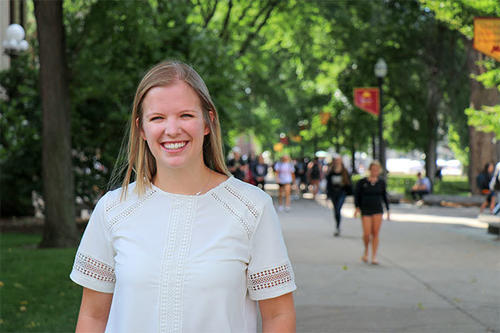
Access to health care in Greater Minnesota is a subject that troubles many leaders, citizens, and health care professionals. Roughly 25 percent of the state’s population lives in rural areas. It can take rural residents hours to drive to the nearest hospital or clinic to receive the care they need, especially if they require a specialist.
There’s a clear need for the next generation of care professionals to look for work beyond the metro area after graduation. Many U of M students are answering the call through the U of M’s Health Services Management program.
Ivy Braaten grew up in Roseau, MN—a town of about 3,000 located just 10 miles south of the Canadian border.
“I just like the small-town vibe, that sense of community that isn’t necessarily there in the metro area,” she says.
After taking a one-credit class at the U of M that introduces students to health careers, she chose the Health Services Management major, in the College of Continuing and Professional Studies. Health services managers advance the health of individuals and communities by planning and coordinating medical and health services.
Recently, Braaten completed an internship with LifeCare Medical Center, a small critical access hospital in Roseau.
“With just 25 beds, it’s a pretty small facility. It’s the only hospital within a 60-mile radius, so they serve a large region,” says Braaten. Like Roseau itself, the atmosphere at LifeCare felt like a small, tight-knit community—and that worked to her advantage.
“During my internship, I had exposure to so many different departments, even the clinical areas. There aren’t as many employees, so everyone has to work together and there are overlaps in responsibilities,” says Braaten.
One project she had the opportunity to work on was a community health needs assessment.
“I noticed some problematic health trends in the community, such as obesity, smoking, and mental health. I took the information and helped the team develop an implementation plan to address the community’s needs for the next three years.”
Braaten would eventually like to work in a rural health care setting, whether or not it’s Roseau.
“The opportunities for rural health care are exciting. Health care is constantly changing, and rural hospitals are finding unique ways to keep the communities they serve close to home in times of need,” she says.
“Minnesota has a lot of opportunity in health services management, and I’m looking forward to beginning my career in the field.”
Learn more about the Health Services Management undergraduate degree program. This story was adapted from a publication of the College of Continuing and Professional Studies.
- Categories:
- Health




